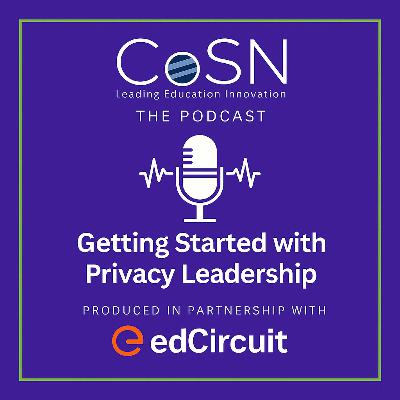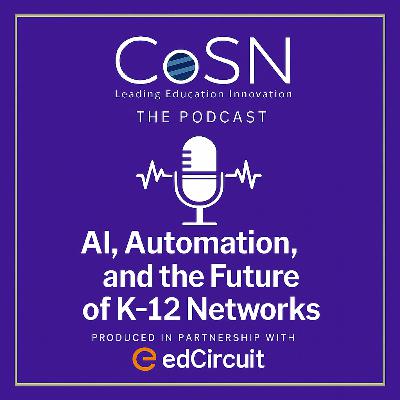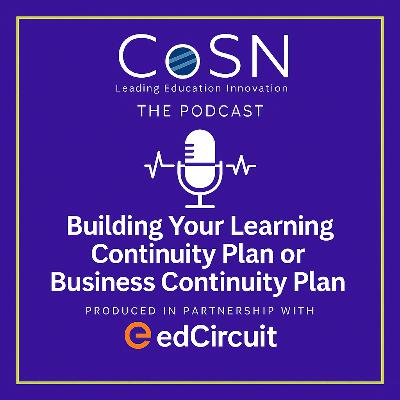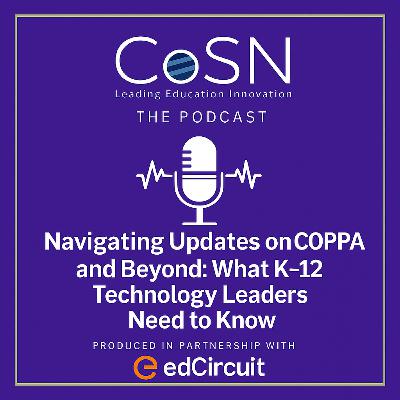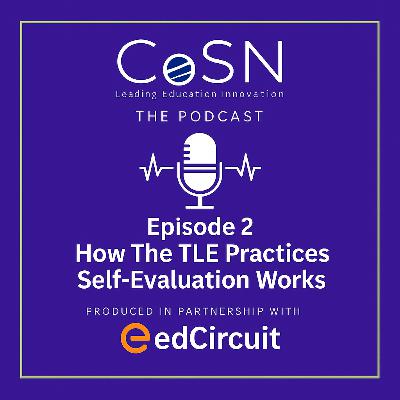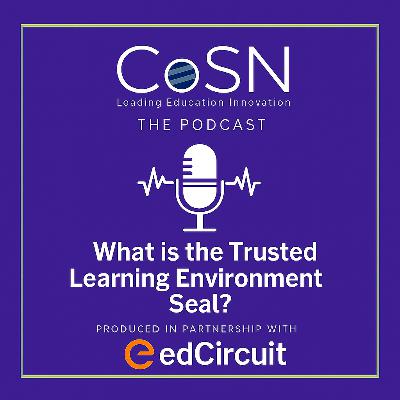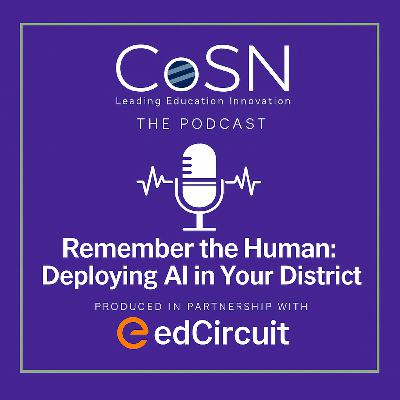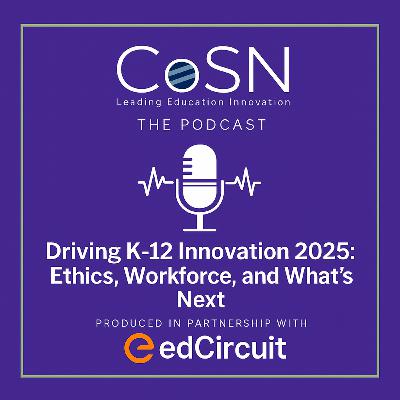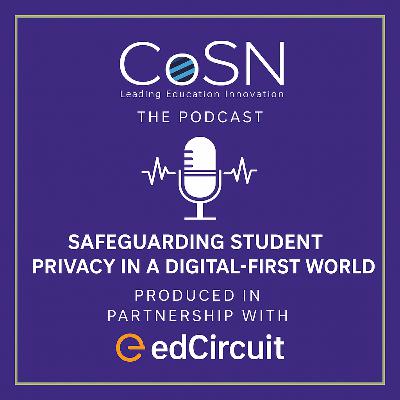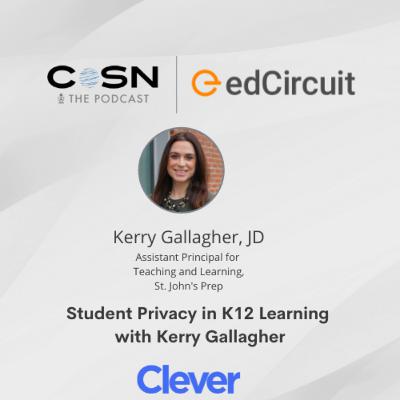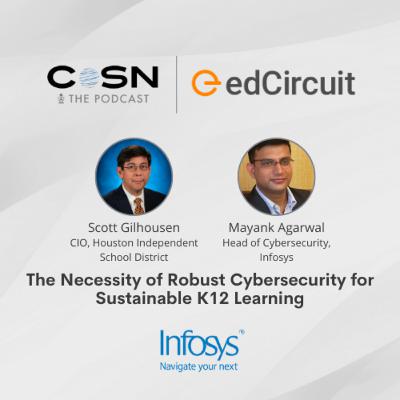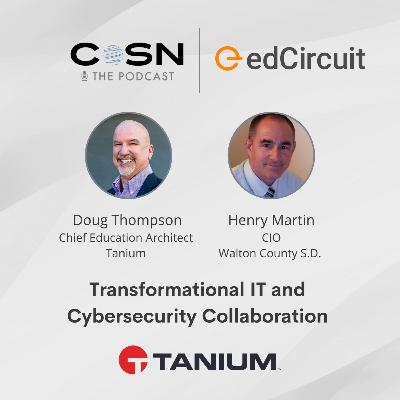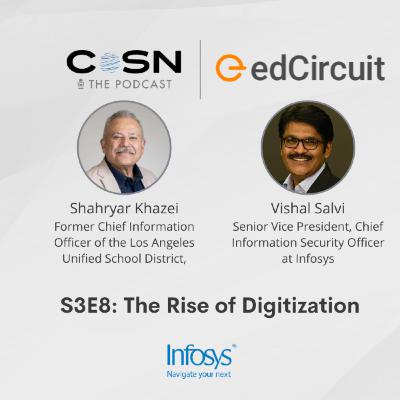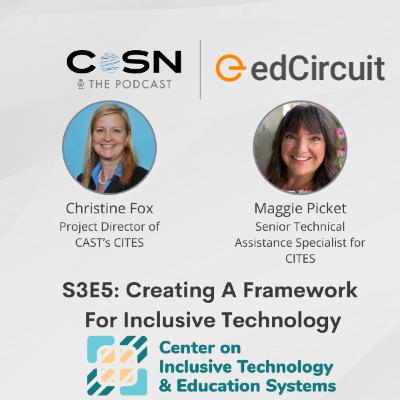Discover The CoSN Podcast
The CoSN Podcast

The CoSN Podcast
Author: COSN - The Podcast
Subscribed: 4Played: 13Subscribe
Share
© COSN - The Podcast
Description
The CoSN Podcast, produced and distributed by edCircuit, provides current and aspiring K-12 edtech leaders with timely insights and strategies to succeed in the ever-evolving world of school system technology. Hear from Certified Education Technology Leaders (CETL), visionary district changemakers, and instructional experts, who will discuss essential topics such as digital equity, innovation, IT leadership, cybersecurity, and more.
91 Episodes
Reverse
Privacy leadership is no longer a “nice-to-have” in K–12 education—it’s an essential foundation for protecting student data, building trust, and ensuring districtwide compliance. In this episode, we break down insights from CoSN’s recent webinar, Privacy Practices in Action: Getting Started with Privacy Leadership, where district leaders shared how they launched and strengthened their privacy programs using the Trusted Learning Environment (TLE) framework.Listeners will learn how two districts—Vance County Schools (NC) and Corpus Christi ISD (TX)—launched, strengthened, and sustained privacy programs grounded in the Trusted Learning Environment (TLE) framework.What You’ll LearnWhy privacy leadership is essential for districtwide data protection.How districts build buy-in from superintendents, board members, principals, and staff.Practical tactics like using real incidents, creating clear documentation, and fostering cross-department collaboration.Common challenges—such as limited time, outdated practices, or lack of documentation—and how leaders overcome them.First steps for getting started, including gap analysis and setting small, achievable goals.Key TakeawayPrivacy leadership is achievable for every district—large or small. With the right framework, collaboration, and incremental progress, districts can build strong, sustainable privacy programs that protect students and support learning.Helpful Links:Student Data Privacy: Privacy Practices in Action - Deep DiveWebinarTrusted Learning Environment Seal (TLE Seal)Building a Trusted Learning Environment: Understanding the Leadership Practice For a complete listing of all CoSN's webinars, please visit: https://www.cosn.org/Produced in partnership with edCircuit. CoSN is vendor-neutral and does not endorse products or services. Any mention of a specific solution is for contextual purposes. This episode was generated in part using AI tools. All content was reviewed and approved by CoSN and the edCircuit editorial team before publication.
This podcast reviews a recent CoSN webinar, “We Survived a Cyber Incident: From Readiness to Recovery,” and explores how one school district successfully contained and recovered from a live cyberattack.Episode SummaryIn January 2024, an Arizona district faced a real cyber incident when a compromised service account allowed a threat actor into the network. Thanks to a strong Cyber Incident Response Plan, rapid quarantine, and a disciplined communication strategy, the district restored critical systems in under 24 hours with no evidence of data exfiltration.Key TopicsHow the incident was detected and escalatedSteps taken to isolate the threat and prevent spreadRapid restoration using layered backupsClear, controlled communication with leadership and staffPost-incident improvements, including MFA expansion and service account cleanupWhy This MattersThe episode highlights actionable lessons on preparedness, planning, and leadership—showing how every district can strengthen cybersecurity before an incident occurs.AssetsWatch the webinar:https://www.youtube.com/watch?v=REzmsuKmIkwWebinar Audio Webinar SlidesFor a complete listing of all CoSN's webinars, please visit: https://www.cosn.org/Produced in partnership with edCircuit. CoSN is vendor-neutral and does not endorse products or services. Any mention of a specific solution is for contextual purposes. This episode was generated in part using AI tools. All content was reviewed and approved by CoSN and the edCircuit editorial team before publication.
In this “From the Vault” episode, we revisit CoSN’s August 2024 webinar, “Trailblazing into 2025: Initiatives that Under-resourced, Suburban & Large Urban Districts Are Implementing Now.” We take a fresh look at the innovative strategies district leaders shared—from VR explorations and virtualized engineering labs to new professional learning structures, AI readiness, UDL integration, and pathways for achieving “yes” in complex environments. This reflective discussion highlights why the themes from 2024 remain essential for district leaders planning in 2025 and beyond.What You’ll Learn:How VR is being used as an equity tool to expand access to transformative learning experiencesWhy virtualizing labs and district systems can increase agility for small tech teamsHow “learn at your own pace” professional learning structures are reshaping educator developmentWays districts are finding creative pathways from “no” to “yes” to drive innovationHow AI is being integrated into UDL strategies and teacher wellness initiativesWhat intentional, student-centered AI adoption looks like in practiceWhy This Matters:Although recorded in 2024, the insights and strategies from this webinar continue to influence district planning, technology integration, and professional learning models in 2025.Resources Mentioned:CoSN Webinar: “Trailblazing into 2025”: Innovations from Under-Resourced, Suburban & Urban DistrictsFor a complete listing of all CoSN's webinars, please visit: https://www.cosn.org/Produced in partnership with edCircuit.This episode was generated in part using AI tools. All content was reviewed and approved by CoSN and the edCircuit editorial team before publication.The products and services mentioned in this webinar are provided for informational purposes only. Their inclusion does not imply endorsement or sponsorship by CoSN or edCircuit.
In this episode, we unpack insights from CoSN’s recent webinar, AI, Automation, and the Future of K–12 Networks. The discussion explores how artificial intelligence and automation are transforming district operations—from network security and data management to staffing, readiness, and responsible adoption.You’ll hear how district leaders and technology experts are using AI to strengthen cybersecurity, streamline help-desk operations, and prepare for a future where intelligent automation supports every aspect of learning and infrastructure.What You’ll Learn in This EpisodeOperational AI in Action: How districts are using automation for help-desk support, network monitoring, and knowledge management.Bridging the Skill Gap: Why training, trust, and transparency are essential for successful AI adoption.Cybersecurity Reinvented: How AI-driven monitoring and “agentic automation” detect, prevent, and respond to attacks in real time.Data Integrity and Ethics: Why clean, secure data is the foundation for every AI initiative.The Maturity Model Framework: Understanding CoSN’s seven domains of AI readiness and where most districts fall on the journey.Vendor Accountability: How to evaluate AI tools for privacy, transparency, and long-term trust.Future Readiness: Preparing students for a 2037 graduation world driven by AI, automation, and emerging quantum technologies.Resources MentionedAI, Automation, and the Future of K–12 Networks CoSN WebinarCoSN.org/AI – Explore CoSN’s survey report, infographics, and webinar replay.CoSN / Council of the Great City Schools AI Maturity Model – Assess your district’s readiness across seven domains.Trusted Learning Environment (TLE) Seal – Strengthen data privacy and protection in K–12.CoSN’s CIRCUITS Committee – Advancing resilient cloud infrastructure and operational innovation in education.Produced in partnership with edCircuit.This episode was generated in part using AI tools. All content was reviewed and approved by CoSN and the edCircuit editorial team before publication.
In this episode, we unpack CoSN’s CIRCUITS — Critical Infrastructure and Resilient Clouds for Unified Innovation and Technology in Schools — Committee's resource, Building Your Learning Continuity Plan or Business Continuity Plan. The discussion explores how districts can create resilience frameworks that keep learning and essential operations running—even when systems go down.You’ll hear how to design, activate, and test a continuity plan that prioritizes safety, communication, and recovery, while preparing your district for both on-prem and cloud disruptions.What You’ll Learn in This EpisodeLearning vs. Business Continuity Plans: How each supports instruction and district operations.Defining scope and priorities: Setting clear activation criteria and identifying mission-critical systems.Safety first: Why life and health take precedence before recovery efforts begin.Communication matters: How to structure leadership coordination and public messaging.Backup and recovery best practices: Testing, storage locations, and cloud provider contract reviews.Recovery site options: Hot sites, cold sites, and cloud recovery—what they mean and when to use them.Testing and validation: Why tabletop exercises and full restoration drills are essential for readiness.Essential documentation: Appendices every plan should include—contacts, maps, sample forms, and recovery plans.Resources MentionedCoSN CIRCUITS Committee – advancing resilient infrastructure and innovation in K-12.Building your Learning Continuity Plan or Business Continuity Plan – download plan Produced in partnership with edCircuit.This episode was generated in part using AI tools. All content was reviewed and approved by our editorial team before publication.
In this episode, we break down CoSN’s webinar, Navigating Updates on COPPA and Beyond: What K–12 Technology Leaders Need to Know. The discussion unpacks how the Federal Trade Commission’s (FTC) latest changes to the Children’s Online Privacy Protection Act (COPPA) affect districts, vendors, and the broader edtech ecosystem.You’ll hear how these updates reshape definitions of personal information, raise the bar for vendor security practices, and clarify the role districts play in managing parental consent for educational tools.What You’ll Learn in This EpisodeCOPPA basics: Why compliance applies to companies, not schools—but why districts still play a critical role.New definitions of personal information: Expansion to include biometrics, government-issued IDs, and mobile phone numbers.Updated parental consent rules: Including text-based verification and clearer processes for education vs. commercial data use.Stronger security standards: Written security plans, annual risk assessments, and third-party compliance requirements.Data retention requirements: Companies must publish and follow clear deletion policies once data is no longer needed.District responsibilities: Why consent should come from the district level—not individual teachers—and how this impacts edtech adoption.What’s next: Compliance timelines, what the FTC left out of the rule updates, and how districts can proactively prepare.Webinar Recording Free for CoSN MembersCoSN Student Data Privacy Toolkit – resources to help districts strengthen privacy practices.CoSN YouTube Channel COPPA Rule Updates – FTC – review the Federal Trade Commission’s official rule changes.Produced in partnership with edCircuit.This episode was generated in part using AI tools. All content was reviewed and approved by our editorial team before publication.
In this episode, we take a practical deep dive into the Trusted Learning Environment (TLE) Practices Self-Evaluation—the first big step districts can take on the journey to earning the CoSN TLE Seal.You’ll learn how the Self-Evaluation helps schools measure their privacy practices across five key areas: Leadership, Business, Data Security, Professional Development, and Classroom. More importantly, you’ll hear how districts can use the results to highlight strengths, identify gaps, and chart a clear path forward.What You’ll Learn in This EpisodeHow the scoring works: From “not yet considered” to “mature policy in place,” and what each rating means.The five practice areas in detail:Leadership – policies, accountability, and culture.Business – vendor vetting and privacy in contracts.Data Security – technical safeguards, audits, and recovery plans.Professional Development – training staff and raising parent awareness.Classroom – how teachers model safe practices and digital citizenship.The real value: Why the Self-Evaluation is less about pass/fail and more about building a roadmap.What happens next: How to turn results into an improvement plan and begin working toward the Full Seal or a Mini Seal.Good news: The Self-Evaluation is free and immediately available to all districts.Resources & LinksCoSN Trusted Learning Environment page – download the Self-Evaluation and learn more about the Seal program.Episode 1: What is the Trusted Learning Environment Seal? Listen to the first part of this series if you missed it.Produced in partnership with edCircuit. This episode was generated in part using AI tools. All content was reviewed and approved by our editorial team before publication.
In this episode, we kick off a two-part series on student data privacy with a deep dive into the CoSN Trusted Learning Environment (TLE) Seal.The TLE Seal is more than just a badge—it’s a commitment that a school system is protecting student data across five critical practice areas: Leadership, Business, Data Security, Professional Development, and Classroom.You will learn:Why the Seal matters for building trust with families and communities.How it goes beyond compliance to create a culture of transparency and accountability.What “mature practices” look like in real schools.Why the Mini Seal can be a flexible entry point for districts starting their privacy journey.With Seal recipients already improving protections for over 1.3 million students, the program is setting the standard for how schools earn the confidence of parents, educators, and students.Key Takeaways:The TLE Seal is both a safeguard and a symbol of trust.It’s a district-wide effort, not just an IT checklist.Schools commit to continuous improvement—not just a one-time certification.The Mini Seal option allows districts to start small and build momentum.Want to learn more? Visit CoSN.org to explore the TLE Seal program, success stories, and resources to begin your district’s journey.Resources:Trusted Learning Environment Seal Application TLE Seal YouTubeTLE Highlights From CoSN2025Additional Key Resources:Benchmark Privacy Practices In Your StateTLE Seal Examples of EvidenceTLE Seal Program HandbookBe sure to tune into Episode 2, where we’ll unpack the TLE Practices Self-Evaluation—the first step in earning the Seal.Produced in partnership with edCircuit. This episode was generated in part using AI tools. All content was reviewed and approved by our editorial team before publication.
In this episode, we explore highlights from CoSN’s recent webinar, Remember the Human: Deploying AI in Your District. Four education leaders: Mike Lawrence (ABC Unified), Jerry Almendarez (Santa Ana Unified/Creative Futures), Christopher Hoang (LACOE), and Chad Laines (ABC Unified), share how they’re implementing AI in real K–12 contexts. From district-wide pilots to county-level training, each speaker emphasizes one guiding principle: AI must enhance, not replace, human intelligence.We cover how districts can start with small, safe experiments, publish guidelines over rigid policies, and focus on transparency with families and students.The conversation also touches on budget strategies, governance models, academic integrity, and real-world classroom use cases.Whether you’re just beginning with AI or refining your district’s approach, this episode provides practical, battle-tested insights for leaders, teachers, and technologists.Key Takeaways:Lead with HI + AI: keep human intelligence at the center.Start small with safe pilots—volunteers, not mandates.Use guidelines (not rigid policy) to stay agile.Put IT leaders at the cabinet table for smarter adoption.Engage students and families through roundtables and communication toolkits.Reframe academic integrity around culture and trust.Leverage existing platforms before buying new tools.Listen in for practical tips, real-world examples, and insights you can bring back to your school or district.Watch the full webinar here: CoSN YouTubeFor a complete listing of all CoSN's webinars, please visit: https://www.cosn.org/Produced in partnership with edCircuit. This episode was generated in part using AI tools. All content was reviewed and approved by our editorial team before publication.
Generative AI. Digital equity. Staffing shortages. These aren’t abstract trends; they’re the real forces shaping schools in 2025. In this episode, Driving K–12 Innovation 2025: Ethics, Workforce, and What’s Next: Insights from a CoSN Webinar, we break down CoSN’s 2025 findings and what they mean for educators today. Based on the Driving K–12 Innovation 2025 Summit webinar, this conversation distills the big themes into practical insights.We explore why ethical innovation requires more than adopting the newest tool, how schools can build capacity to retire outdated tech, and why preparing students for the future of work means redefining success beyond test scores.Key Takeaways:Innovation isn’t good or bad until it’s anchored to purposeEthical capacity must be built among teachers and studentsSchools need to know when to retire tools that no longer serve learningAdaptability, creativity, and new pathways are critical to the future workforceResources:Driving K–12 Innovation 2025 ReportBridges Supplement: Ethical InnovationBridges Supplement: The Future of WorkDriving K–12 Innovation 2025 Summit (companion webinar recording)Listen in for practical tips, real-world examples, and insights you can bring back to your school or district.Watch the full webinar here: CoSN YouTubeFor a complete listing of all CoSN's webinars, please visit: https://www.cosn.org/Produced in partnership with edCircuit. This episode was generated in part using AI tools. All content was reviewed and approved by our editorial team before publication.
Cellphones are everywhere in schools — in backpacks, pockets, and sometimes under desks. But should they be banned, restricted, or embraced as learning tools? In this episode, inspired by CoSN’s To Ban or Not to Ban? Tackling Cellphones in Classrooms webinar, Common Sense Media’s Merve Lapus reframes the debate.We explore why banning phones alone doesn’t teach digital discipline, how schools can combine policy with digital citizenship education, and the role of community alignment in making rules stick. Hear real-world examples like phone-free zones, lockable pouches, and student-led policy design — all aimed at building intentional, balanced tech use.What you’ll learn in this episode:Why rules alone don’t create lasting digital habitsStrategies for pairing cellphone policies with digital well-being lessonsHow to engage students, staff, and parents in shaping expectationsPractical activities to help students self-regulate device useWhether you’re a teacher, principal, or district leader, this episode offers actionable ways to move beyond bans and prepare students to thrive in a tech-driven world.Listen in for practical tips, real-world examples, and insights you can bring back to your school or district.Watch the full webinar here: CoSN YouTubeFor a complete listing of all CoSN's webinars, please visit: https://www.cosn.org/Produced in partnership with edCircuit. This episode was generated in part using AI tools. All content was reviewed and approved by our editorial team before publication.
In this episode of the CoSN Podcast, we recap highlights from CoSN’s webinar Safeguarding Student Privacy: Ethical Use of AI in K–12 Education. Why student privacy is about trust, not just compliance.How districts are building strong data governance frameworks.Key federal privacy laws—FERPA, COPPA, and PPRA—and why they’re struggling to keep pace with technology.What to ask edtech vendors before adopting new tools.Emerging privacy challenges with AI, from algorithmic bias to data provenance.Listen in for practical tips, real-world examples, and insights you can bring back to your school or district.Watch the full webinar here: CoSN YouTubeFor a complete listing of all CoSN's webinars, please visit: https://www.cosn.org/Produced in partnership with edCircuit.
Student privacy is a growing concern across K12 education. Although many digital tools and edtech providers have invested in student data privacy, many stakeholders are calling for more training, awareness, and cybersecurity in the classroom. How can we guarantee that students get the best possible experience leveraging edtech tools and that their data is secure and privacy safeguarded? In this episode of the CoSN Podcast, we discuss student data privacy, increasing awareness, vetting procedures, and more. There is no doubt that schools have a responsibility to protect student data and maximize student data privacy. In order to do this, schools must implement proactive strategies and training to support staff and increase student safety. Today’s guest is Kerry GallagherKerry Gallagher, JD, is an innovative teacher, school administrator, lawyer, TEDx speaker, keynote speaker, education consultant, downhill skier, hiker, mom, and wife. She has over 20 years of experience as a professional educator. Kerry currently serves as Assistant Principal for Teaching and Learning and classroom teacher at St. John’s Preparatory School in Danvers, Massachusetts, and Director of Education at ConnectSafely, an internet safety non-profit in Palo Alto, California. Kerry is co-author of several ConnectSafely award-winning guidebooks for parents and teachers on topics that include social media, data privacy, education technology, copyright, and more. Accolades for her work include awards from the Family Online Safety Institute, St. Anselm College, MassCUE, SmartBrief, and Tech&Learning. She’s been recognized as a FutureReady Schools Instructional Coach, ASCD Emerging Leader, Adobe Education Leader, PBS LearningMedia Digital Innovator, and EdSurge Columnist. Her passions include digital wellness, innovative professional learning, and effective integration of curriculum, pedagogy, and technology. She is on social media @KerryHawk02.This episode of The CoSN Podcast is supported by CleverEngage further in the discussion on Twitter. Follow: @CoSN, @edCircuit, @CleverThe CoSN Podcast is produced in partnership with edCircuit. To learn more about CoSN, visit www.cosn.org, and to learn more about at edCircuit, visit www.edcircuit.com.
We must invest in effective cybersecurity to mitigate these risks and increase the health of our K12 schools. In the third part of this three-part series on K-12 Education and Cybersecurity, our guests share backgrounds, standards, and strategies for cybersecurity success. Overall this conversation highlights the multitude of factors that add up to increase the health and security of K12 data systems and cybersecurity. There is no doubt that the work of our guests and IT professionals across the education sector is essential. Today’s guests are Mayank Agarwal and Scott Gilhousen. Mayank Agarwal is the Head of the Cybersecurity business in North America for Infosys. He is responsible for customer engagements, sales, analyst engagement, GTM strategies with tech partners and start-ups in North America. In addition, Maynak is proficient in managing strategic relationships with CIOs, CISO’s, Head of Cloud and Infrastructure, etc. Mayank is an accomplished and astute professional with the perfect mix of sales acumen and technology expertise.Scott Gilhousen is the Chief Information Technology Officer for the Houston Independent School District (HISD), where he leads all aspects of information technology, data and analytics, and information security. With over two decades of experience in strategic and operational leadership roles, Scott brings a wealth of expertise to his current position as CITO.This episode of The CoSN Podcast is supported by Infosys. Engage further in the discussion on Twitter.Follow: @CoSN, @edCircuit, @InfosysThe CoSN Podcast is produced in partnership with edCircuit. To learn more about CoSN, visit www.cosn.org, and to learn more about at edCircuit, visit www.edcircuit.com.
How do you balance technological accessibility and cybersecurity? This is a question many school districts have asked over the past several years. Particularly during remote learning, many districts challenged their preconceived notions on accessibility and cybersecurity, leading to many robust changes in districts nationwide.
In this conversation, special guests Doug Thompson and Henry Martin discuss how schools can best implement transformative IT and ensure that sensitive data protection maintains its secure status through collaborative planning and execution.
Doug Thompson is the Chief Education Architect at Tanium. He is a passionate storyteller, TEDx speaker, Go Tanium Tech Stories Podcast host and digital transformation warrior. After a 20-year stint at Microsoft, he came to Tanium, where he acts as a Tanium Technical Solutions Engineer and Education Strategist. He has been involved in the Education arena for over a decade, working with some of the US's largest K-12 and Higher Education institutions.
Henry Martin is the Chief Information Officer at Walton County School District in DeFuniak Springs, Florida, and is a member of the Florida Technology Council. Henry has streamlined and established career pathways and professional development for IT personnel across the district.
A key takeaway from this conversation is the power of collaboration in creating innovative systems and the importance of patching and communication for managing automated systems.
This episode of The CoSN Podcast is supported by Tanium.
Engage further in the discussion on Twitter. Follow: @CoSN, @edCircuit, @Tanium
The CoSN Podcast is produced in partnership with edCircuit. To learn more about CoSN, visit www.cosn.org, and to learn more about at edCircuit, visit www.edcircuit.com.
As school digital ecosystems expand and rapidly become more at threat, there needs to be a transparent understanding of building and adapting functionally digitized systems.
In the second part of this three-part K-12 Education and Cybersecurity series, our guests discuss the expansion of more developed operational and learning management systems in schools and strategies for successful implementation and change management.
As both of this episode's guests can attest, school districts' use of digitization has expanded dramatically over the past decade, and there are a host of challenges technology and education practitioners need to be aware of.
Today’s guests are Shahryar Khazei and Vishal Salvi.
Shahryar Khazei is a seasoned IT executive with over 36 years of experience in the private and public education industry. He was the Chief Information Officer of the nation’s second-largest school district, the Los Angeles Unified School District (LAUSD). After retiring from LAUSD, Khazei founded Macaw Consulting, which provides strategic and management consulting services to school districts, non-profit organizations, and for-profit companies in the education sector across the United States. In 2021, he joined the Board of Directors at the Consortium of School Networking (CoSN)
Vishal Salvi is Senior Vice President, Chief Information Security Officer, and Head of the Cyber Security Practice at Infosys. He is responsible for the overall information and cyber security strategy and its implementation across Infosys Group. Vishal has over 25+ years of industry experience in Cybersecurity and Information Technology across different Industries. He is part of various Advisory Councils and Boards to provide leadership and direction on cybersecurity frameworks and standards to drive the adoption of cybersecurity across the industry. He has participated in various case studies related to cybersecurity practices over the past decade. Follow Vishal on Twitter at @VishalSalvi
This episode of The CoSN Podcast is supported by Infosys. Learn more at https://www.infosys.com/
Engage further in the discussion on Twitter. Follow: @CoSN, @edCircuit, @Infosys
The CoSN Podcast is produced in partnership with edCircuit. To learn more about CoSN, visit www.cosn.org, and to learn more about at edCircuit, visit www.edcircuit.com.
In an ever-growing connected world, cybersecurity is a growing issue that often gets overlooked. From financial risks to personal information risks, cybersecurity risks have changed the landscape of K12 and higher education. Despite the growing risks, we have yet to see a hyper-awareness of school and community leaders of the landscape of cybersecurity impact.
In the first part of this three-part K-12 Education and Cybersecurity series, our guests discuss why cybersecurity is so important, current risks, often overlooked struggles, the significance of collaboration, and more. This conversation aims to address the issues at hand and improve awareness of cybersecurity strategies.
Today’s guests are Mitrankur Majumdar and Lenny J. Schad.
Mitrankur Majumdar is a passionate, innovative, and strategic business leader with 23 years of experience specializing in executing business transformation through technology and process intervention. At Infosys, Mit is responsible for positioning the company as a global systems integrator across Information Services, Publishing, professional services, education, travel, hospitality, and EPC companies. Apart from helping his customers with their IT or BPO landscape.
Lenny Schad, Chief Information & Innovation Officer for District Administration, has worked in K-12 since 2003, successfully leading the implementations of BYOD and 1:1 in Katy ISD and Houston ISD, respectively, as the CIO. Lenny has served as a board member for CoSN and is a published author. His book “Bring Your Own Learning: Transform Instruction with any Device” has helped many organizations implement digital transformation initiatives.
This episode of The CoSN Podcast is supported by Infosys. Learn more at https://www.infosys.com/
Engage further in the discussion on Twitter. Follow: @CoSN, @edCircuit, @Infosys, @mitrankurm, @Lschad
The CoSN Podcast is produced in partnership with edCircuit. To learn more about CoSN, visit www.cosn.org. Learn more about edCircuit, visit www.edcircuit.com
Over the past two years, we have seen technology use in the classroom skyrocket. From assessment tools to curriculum support, these technologies are essential to classrooms in districts across the country. Hand in hand with the bloom in learning technologies, inclusive technologies have become a major topic of discussion in the education world.
In part two of this two-part series sponsored by the Center on Inclusive Technology & Education Systems (CITES) at CAST, our guests discuss how to implement a technology program that meets the needs of all learners. Step by step- setting standards, creating guides for teachers, sourcing and vetting vendors, and communicating support, this episode explores how district leaders can implement a comprehensive program to support all students with stories and examples from district leaders themselves.
Today’s guests are two leaders from the Jenks Public Schools in Jenks, Oklahoma – District Assistive Technology Coordinator Janna Greathouse and Edtech Coordinator Samantha Reid.
Janna graduated from the University of Tulsa in Oklahoma with a Master’s degree in Speech Pathology. She has practiced as a speech-language pathologist in public school systems in the Carolinas and in Oklahoma, where she currently works. . Her latest pursuits involve efforts to increase accessibility, equity, and inclusion district-wide so that students are empowered to be experts in their own learning and are supported in doing so.
Samantha obtained her M.Ed in Curriculum and Instruction with an Emphasis on Technology Integration in Education from UNLV in 2006, after which she began working in EdTech. Prior to moving into EdTech, she taught in Elementary School. Samantha is an ISTE Certified Education as well as receiving several other certifications and Micro-credentials through the years. She has done training all over the region and has presented at several EdCamps, Google Summits, and conferences, including ISTE, TCEA, FETC, and CoSN.
This episode of The CoSN Podcast is supported by the Center on Inclusive Technology & Education Systems (CITES) at CAST. Learn more at https://cites.cast.org/
Engage further in the discussion on Twitter. Follow: @CoSN, @MindRocketMedia, @cafox, @MaggieP, @CAST_UDL, @JoSenja, @GreathouseJanna
The CoSN Podcast is produced in partnership with MindRocket Media Group and published on edCircuit. To learn more about CoSN, visit www.cosn.org. Learn more about MindRocket Media Group at www.mindrocketmediagroup.com.
Read the transcript of this interview here: https://edcircuit.com/creating-a-framework-for-inclusive-technology-part-2-s3e6/
Over the past two years, we have seen technology use in the classroom skyrocket. From assessment tools to curriculum support, these technologies are essential to classrooms in districts across the country. Hand in hand with the bloom in learning technologies, inclusive technologies have become a major topic of discussion in the education world. What is inclusive technology in education? The aim of inclusive technology is to create environments using technological resources to ensure that all students can thrive academically. In part one of this two-part series presented by the Center on Inclusive Technology & Education Systems (CITES) at CAST, our guests discuss inclusive technology practices, collaboration, investment in educational accessibility, and implementing the CITES framework.
Today’s guests are Christine Fox and Maggie Picket. Christine Fox, MS, is the Project Director of CAST’s CITES project and a Senior Technical Assistance Specialist. Prior to joining CAST, Christine was the Senior Director of External Relations for the Consortium for School Networking (CoSN), where she was responsible for corporate partnerships and professional advancement programs and supported federal advocacy efforts regarding digital equity and cybersecurity. She is also a former curriculum coach, ESL Coordinator, and classroom teacher. Maggie Picket is a Senior Technical Assistance Specialist for CITES, Maggie explores systemic integration of Assistive Technology, Information Technology, and Educational Technology systems in partnership with districts. For over a decade, Maggie has worked with teachers, students, administrators, para-professionals, families, and community partners to build a common understanding of how creating engaging and accessible learning for ALL is possible.
This episode of The CoSN Podcast is supported by the Center on Inclusive Technology & Education Systems (CITES) at CAST. Learn more at https://cites.cast.org/
Engage further in the discussion on Twitter. Follow: @CoSN, @MindRocketMedia, @cafox, @MaggieP, @CAST_UDL
The CoSN Podcast is produced in partnership with MindRocket Media Group and published on edCircuit. To learn more about CoSN, visit www.cosn.org. Learn more about MindRocket Media Group at www.mindrocketmediagroup.com.
Read the transcript of this interview here: https://edcircuit.com/creating-a-framework-for-inclusive-technology-s3e5/
A common phrase in the cybersecurity world is “cybersecurity is not a priority until it has to be.” Security measures are essential to schools, and as we will discuss in this episode, good procedures ensure safety success. In this episode presented by Telos, Our guests today discuss bad actors, sensitive data, low-hanging data, federal funding, and why cyber security is an essential core function of every school district.
Today’s guests are Pete Cevenini and Vincent Scheivert. Pete is the former Montgomery County Public School (MD) Chief Information Officer & Former Maryland State Department of Education CIO. Pete was named to the “Leading Data and Technology Executives U.S. Public Education List” by Chief Data Officer Magazine. He is a career educator, having served many other roles, including high school principal, curriculum director, and graduate professor. Vince is the Vice President of Solutions and former Director of Technical Strategy at Telos Corporation, helping businesses, governments, and school systems improve their cybersecurity protections and operations. Prior to joining Telos, Vince was the Assistant Superintendent for Digital Innovation at Loudoun County Public Schools and the Chief Information Officer at Albemarle County Public Schools, where CoSN recognized him as the Chief Technology Officer of the year. He has also held IT leadership positions at the Downington Area School District, the West Chester Area School District, and Fairfax County Public Schools.
This episode of The CoSN Podcast is supported by Telos. Learn more at https://www.telos.com/solutions/k12-and-higher-education/.
Engage further in the discussion on Twitter. Follow: @CoSN @MindRocketMedia @telosnews.
The CoSN Podcast is produced in partnership with MindRocket Media Group and published on edCircuit. To learn more about CoSN, visit www.cosn.org. Learn more about MindRocket Media Group at www.mindrocketmediagroup.com.


